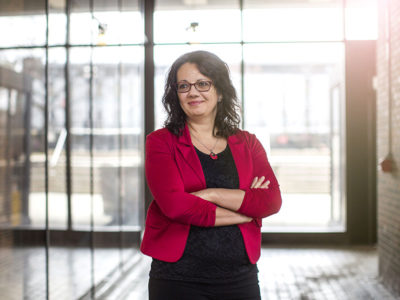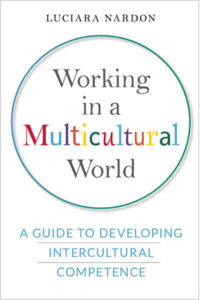An agent of change: Working towards a collaborative, multicultural work environment
Luciara Nardon is not only creating a new narrative on how to do research in business, but she is also an agent of change who is dedicated to cultural and societal advancements relating to multicultural work environments and establishing strategies that help immigrants adjust to a new country and its cultural milieu. In fact, she has been recently distinguished with Carleton’s 2018 Research Achievement award for her work on immigrant workforce integration.
Nardon has a multidisciplinary research program where she delves into the sociological and behavioural side of business. Much of her research looks at how people think and behave within a work environment, which is often influenced by their cultural background. Nardon’s academic career didn’t start out in this direction, however; in fact, it was somewhat serendipitous that her academic journey brought her to where she is today.

Nardon was born and educated in Brazil, where she earned two Accounting degrees and worked in this field for several years. It was during this time that she was able to be an integral part of the management team and the transition process of a merger and was exposed to some multicultural issues around miscommunications and unmet expectations between business partners. Intrigued by the behavioural element of this experience, she was fueled to return to academia—earning an MBA and then a PhD in International Management. Following this, she lived and worked in Belgium, gaining worldly experience and firsthand accounts of life as a foreigner.
Perhaps like a fish out of water, everyone can appreciate the feeling of not fitting in, or misreading the cues of another person’s meanings and gestures. Nardon is passionate about understanding the cognitive process that can influence and facilitate a cohesive and collaborative working environment. She works under the assumption that in the 21st century, and a global business environment, we are all working with members who bring new cultural perspectives to the table. Even with her background in numbers, Nardon’s approach to research is socially constructivist, with a focus on reflective, qualitative data.
“Intercultural encounters are a pervasive feature of our modern workplaces and affect most of us.”

Her most recent accomplishment is her breakthrough book, Working in a Multicultural World: A Guide to Developing Intercultural Competence (University of Toronto Press, 2017). Her book is changing the dialogue around multicultural business constructs that managers, employees, clients, teachers, and students—anyone working and living within a multicultural framework—can use to better understand how to navigate in a changing world. Nardon recognizes the need to develop an understanding of one’s own cultural self to drive change and to develop a level of empathy to foster a collaborative, efficient, intercultural working environment, based on the concept that “we typically attribute culture to others but not ourselves.” Her book offers a comprehensive framework for understanding intercultural interactions and developing practical skills for productive intercultural exchanges to improve overall workplace efficiencies and perhaps, a more synergistic work culture overall.
A further testament to Nardon’s unique approach to business exploration, she is exploring how technology plays a role in how people adjust to foreign environments. She’s published unparalleled research on the topic of immigrants’ use of blogs as an online narrative of their experiences and how this sharing of knowledge, strategies, and opinions, creates a support system for immigrants to help them adjust to a new culture. What people think and experience are important pieces of information to learn what issues immigrants face while adjusting to new cultures. Her study describes the phenomenon of sensemaking in blogging and identifies triggers, mechanisms, and introspective focus of cultural sensemaking in newcomers’ blogs. An increase in international mobilization of skilled workers has become an important topic within organizational, economic, and national arenas and is essential to Canada as it relies heavily on skilled migrants to fill labour market needs. Nardon recognized a gap that exists between the successful employment of skilled professionals and the failure in the Canadian system to attract, foster, and retain newcomers, resulting in downward career mobility and talent waste. Using a sense-making approach—she explores the consequences of, and relationship between, an unsupportive migrant system and migrants’ perception of why they have moved to Canada. One of her studies focused on the experience of skilled engineers from the Philippines finding employment in Canada. What was interesting about her findings was that so much of one’s experience is not only influenced by the existing constructs within Canada to support skilled migrants, but also on the reason for moving in the first place. If there was a predetermined goal of working only as an engineer versus moving to create a new life—in whatever workplace was possible, then their experiences, outcomes, and perceptions were shaped accordingly. By better understanding what motivates, shapes, and defines perceptions
and experiences, then policy, constructs and strategies can be developed to support, manage, and foster a nation that flourishes under unity and multicultural richness.
From Brazil, to the US, Belgium, and many places around the globe, Nardon has worked, taught, and inspired many, but as a multitalented, and multinational thinker and visionary, she has found solace in Canada, a country that made her feel welcomed and allowed her to thrive and contribute. Paying it forward, Nardon is not only shaping the direction of organizational constructs on culture and acceptance in business, but she’s a true humanitarian, and volunteers her personal time to mentoring and coaching newcomers to Canada—a place that they can call home too.